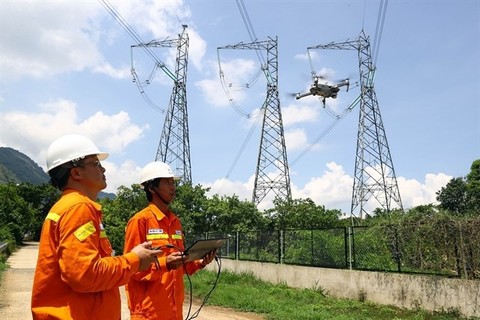
Workers of EVN use drones to check the transmission system in Lâm Đồng Province. — VNA/VNS Photo Huy Hùng
Việt Nam Electricity (EVN) expects the Government to allow it to implement new power generation projects to ensure stable and safe electricity supply to meet socio-economic development demand.
EVN and its three power generation units currently account for 38 per cent of the total power capacity of the whole system, or 31.360MW.
Under the eighth national power development plan (PDP8), EVN is developing ten power generation projects with a total capacity of 6,793MW, which is predicted to still fall short of demand, EVN said.
Among these projects, the 360MW expanded Ialy hydropower project is expected to go operational in the next two months. The expanded 480MW Hòa Bình hydropower project is scheduled to generate electricity by 2025 and the 1.200MW Quảng Trạch 1 thermoelectricity power project should go operational in 2026.
Preparations are already underway for other projects including the expanded Trị An hydropower with a capacity of 200MW and Bắc Ái hydropower with a capacity of 1,200MW expected at the end of 2024.
Other projects which are in the preparation phase include the Quảng Trạch 2 thermoelectricity with a capacity of 1,500MW, Dung Quất 1, 3 gas-fired power projects, an expanded Tuyên Quang hydropower, an expanded Sê San 3 and 4 hydropower and the expanded Sơn La hydropower system.
EVN also expected to get nod for the implementation of an offshore wind power plant in the northern region with a capacity of around 810-1,000MW and 300MW flexible power plant in Ninh Bình.
According to PDP8, EVN and its members will hold around 25.4 per cent of the total power system’s capacity by 2030, in which, EVN will directly manage 13.4 per cent.
However, EVN said that it might be difficult for EVN to fulfill its role in ensuring adequate power supply if it is not allowed to implement new electricity generation projects.
The total power capacity of the entire system is estimated at around 80,900MW but due to uneven distribution, the northern region is facing with risk of electricity shortage during dry seasons.
When the three-circuit 500kW transmission system is completed and able to transmit power from the central to the northern region, it will help increase power supply for the North by 3,000MW, basically meet the region’s demand for the next one to two years only.
While electricity supply remains a problem in coming years, developing new power generation projects is important, EVN said.
In a recent report to the Government, EVN raised two scenarios for electricity supply in 2025 in which the demand increase by 9.4 per cent and 13.2 per cent over 2024, respectively.
EVN said that electricity supply will basically meet the demand in most months in 2025, but there is some risks of shortage for the northern region in peak dry months from May to July in case the demand increases sharply.
EVN pointed out that the implementation of some new power generation projects are slow, so will impact the supply of electricity next year, coupled with the possibility of a drop in gas supply for power generation.
The development of thermoelectricity projects will face difficulty in arranging capitals after Việt Nam commits to achieving net zero by 2050, while the renewable energy projects are waiting for more detailed policies from the Government.
Recently, Prime Minister Phạm Minh Chính asked EVN to raise specific solutions to ensure adequate power supply throughout 2025. — VNS